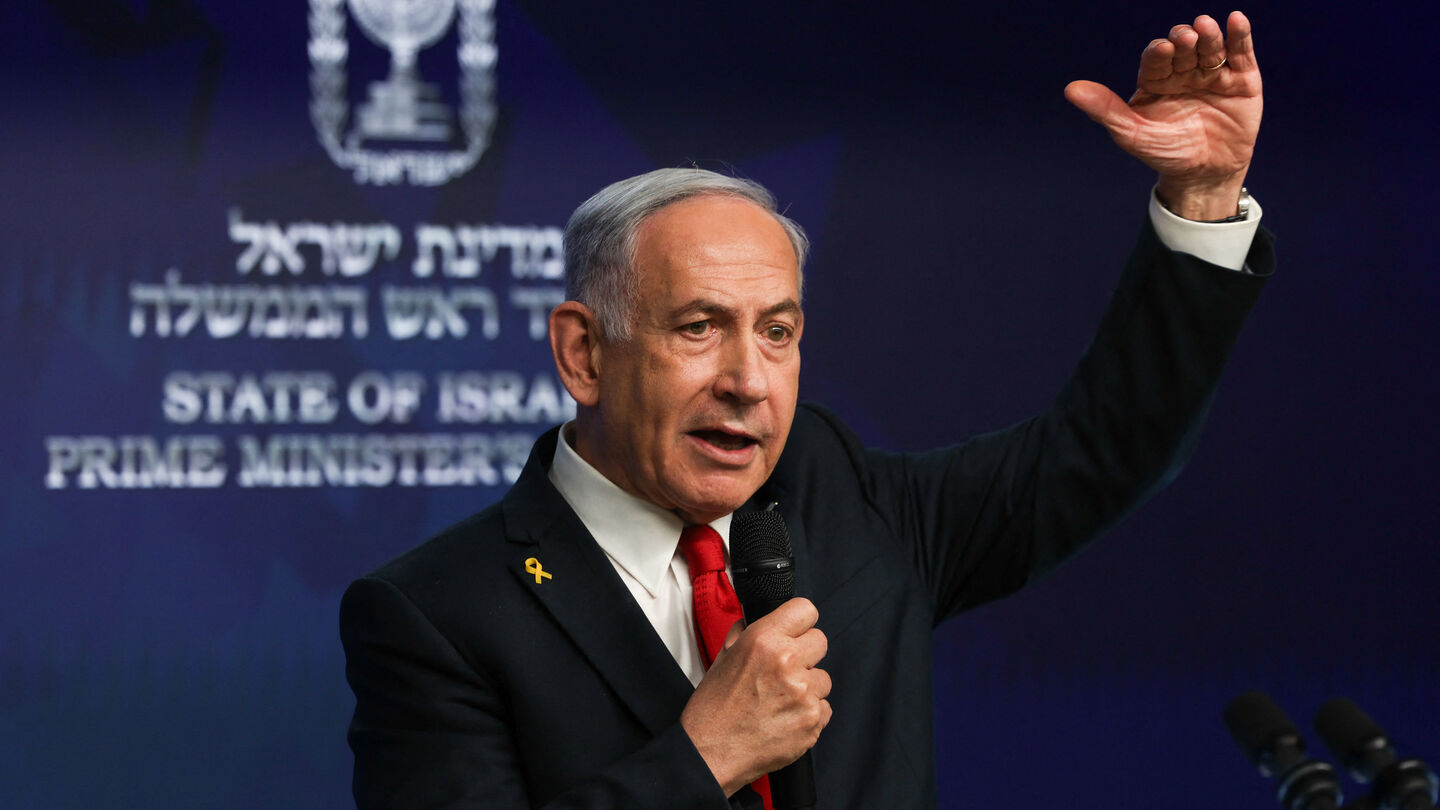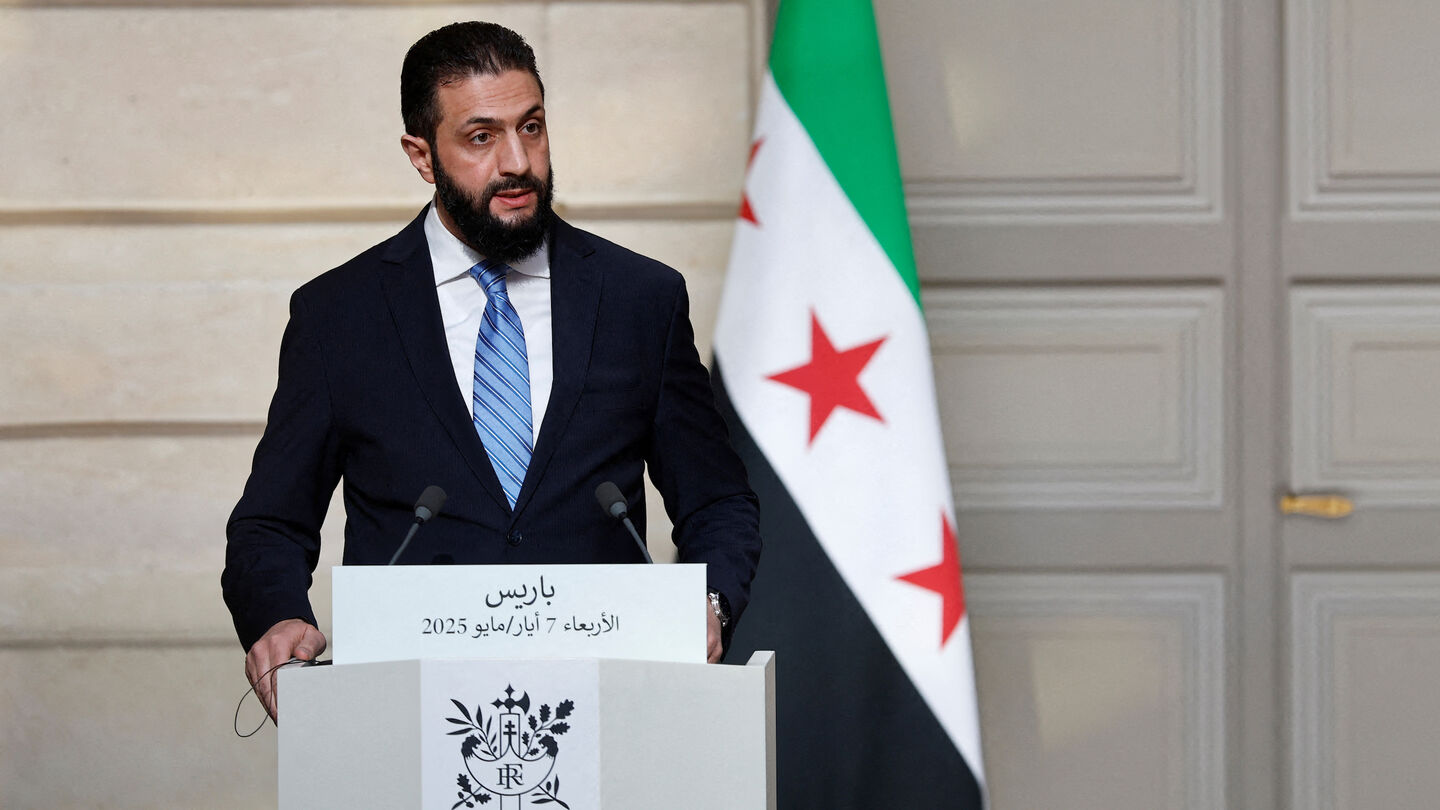Will Netanyahu meet Syria’s Sharaa in New York?
Welcome back to Al-Monitor Israel.
Israeli officials are divided over whether to seize the moment and pursue a security agreement with Syria, with some convinced that Syrian President Ahmed al-Sharaa cannot be trusted. Others point to Israel’s past rapprochement with Turkey and how relations eventually deteriorated. No one wants a repeat of that experience with Syria.
We explore that and more,

Leading this week
Syrian President Ahmed al-Sharaa speaks during a joint press conference with France's president after a meeting at the Elysee Palace in Paris, on May 7, 2025. — STEPHANIE LECOCQ/AFP via Getty Images
Could rapprochement with Syria be in the offing?
After returning from Washington on Thursday, Israeli Prime Minister Benjamin Netanyahu began planning his next visit to the United States, this time for the annual UN General Assembly meeting in September. One of the biggest questions already circulating ahead of that visit is whether Netanyahu will meet with Syrian President Ahmed al-Sharaa while in New York. A glimpse into what could happen in New York took place at the Israeli Knesset this week, when a Syrian activist, Shadi Martini, paid a rare visit to the Israeli parliament, where he shared details with a group of Knesset members about a recent meeting he had had with Sharaa that he said focused on Israel.
“One thing that stuck with me that President al-Sharaa said was: ‘We only have these opportunities one time every 100 years. It’s a very unique opportunity, but the window will not always stay open,’” Martini said.
Despite lingering mistrust, particularly given Sharaa’s Islamist background, some Israeli officials see his rise as an opening to end decades of hostility. The US administration, including Donald Trump and his ambassador to Turkey, Tom Barrack, has strongly encouraged the rapprochement. A senior Israeli security source told Al-Monitor that meetings between Israeli and Syrian officials are now routine, most of them held in Turkey with American mediation.
The central obstacle between the two sides remains Syria’s demand that Israel return the Golan Heights, seized in 1967 and annexed in 1981. Israel flatly rejects doing so. The current proposal under discussion would grant Sharaa international legitimacy and desperately needed aid as well as the withdrawal of Israeli forces from strategic locations occupied along the border after the fall of President Bashar al-Assad's government last December.

Netanyahu's Washington visit — What happened and what didn’t

Israeli Prime Minister Benjamin Netanyahu gives a press conference in Jerusalem on May 21, 2025. Netanyahu said on May 21 that he was ready for a "temporary ceasefire" to guarantee the return of hostages held in Gaza, of whom 20 are "certainly" alive. — RONEN ZVULUN/POOL/AFP via Getty Images
The Israeli prime minister had requested a White House meeting shortly after US forces struck Iran’s nuclear facilities at Fordow, Isfahan and Natanz. It was meant to be a joint celebration, a photo op marking the successful blow to Tehran’s nuclear ambitions.
By the time Netanyahu departed for Washington, however, Israeli attention had turned elsewhere. A sense of momentum was building around a possible ceasefire deal with Hamas that might include the release of hostages still held in Gaza. Even Trump acknowledged that negotiations were advancing in ways they had not before. Netanyahu, just before departing Israel, sent his negotiating team to Doha, raising hopes among hostage families for a breakthrough announcement during a White House dinner on Monday.
Netanyahu’s wish list for the dinner surely included several items: announcements on a Gaza deal as well as on a Syria deal; Trump giving Israel a green light to strike Iran again, if deemed necessary; and perhaps even concrete steps toward expanding the 2020 Abraham Accords.
Netanyahu must have been disappointed with the absence of sensational announcements during the Monday dinner. More revealing, however, was the subtle gap it exposed between the two leaders' priorities. While Trump emphasized the need to end the war in Gaza, Netanyahu remained focused on Iran. Still, in some ways, Netanyahu got part of what he came for. In response to reporters’ questions, Trump said he supported renewed nuclear negotiations with Iran, but added, “If necessary, we will consider attacking Iran again.”
For Trump, Netanyahu's visit was another opportunity to press Israel to make advances on a Gaza deal. As Al-Monitor’s Elizabeth Hagedorn noted, several key issues remain unresolved in the negotiations with Hamas. Unlike the previous ceasefire arrangement, the current proposal places greater emphasis on Trump’s role in driving the process forward.
The challenge, however, is that the United States cannot guarantee outcomes with respect to either side. Ghaith al-Omari, senior fellow at the Washington Institute for Near East Policy, told Al-Monitor, “They [the Trump administration] will not push the Israelis beyond what the Israelis are willing to accept.” Omari also said he did not see it as politically viable for Netanyahu to come and say the war is over. He further added, “I don't see it also as politically viable for Hamas to come and say, ‘We’re going to raise the white flag, disarm and get out of Gaza.’”
Less complicated for Netanyahu was his meeting Wednesday at the Pentagon with Secretary of Defense Pete Hegseth. The two appeared in sync, praising the capabilities of the US military. During the meeting, Hegseth revealed that stealth-capable F-22 Raptors and F-35 Lightning II fighter aircraft had taken part in the June 22 strike on Iranian nuclear sites. Until the meeting, Pentagon officials had been reluctant to publicly confirm which aircraft had escorted the B-2 bombers to their targets.
Despite high expectations, Netanyahu’s visit to Washington concluded without any breakthrough agreements — no Gaza ceasefire deal, no concrete decision on the Iranian nuclear file, and no progress revealed on talks with Syria. Ynet reported on Thursday, however, that Israel has agreed to allow Qatar and other donor countries to begin transferring reconstruction funds to Gaza once a proposed 60-day ceasefire takes effect, enabling reconstruction to start immediately.
This arrangement removes a hurdle in the way of a ceasefire deal. Hamas had demanded that reconstruction begin as soon as a ceasefire is in place, while Israel had insisted that funding come not only from Qatar but from a broader group of international donors.
While in Washington at a meeting with families of Israeli hostages, Netanyahu said he was optimistic about reaching an agreement with Hamas but cautioned that the two sides are not there yet. “The deal could happen soon. I’m working on it,” he said, “You must be patient.”

Photo of the week

US President Donald Trump (C) and Israeli Prime Minister Benjamin Netanyahu (R) attend a dinner in the Blue Room of the White House on July 7, 2025 in Washington, DC. (Photo by Andrew Harnik/Getty Images)

Nvidia plans large Israel expansion
Nvidia’s announcement earlier this week of plans to expand its presence in northern Israel has drawn significant attention. The company’s intention to build a new multibillion-dollar tech campus has prompted at least five municipalities to express interest in hosting the project. Nvidia already operates a research and development center in Yokneam, but it has not yet confirmed whether the new campus will also be located there.
The company is reportedly looking for a relatively large site — between 70 and 120 dunams (about 30 acres) — with rights to build out to 180,000 square meters. That scale is notable for Israel and has contributed to the growing interest around the project, especially following Nvidia’s recent rise in market value, which neared $4 trillion last week.
Nvidia’s R&D operations in Israel are already the largest it maintains outside the United States. Last year, the company acquired Israeli AI startup Run:ai for an estimated $700 million.
Meanwhile, titan chipmaker Intel is expected to lay off dozens of workers at its Kiryat Gat facility in southern Israel. The expansion of Nvidia’s operation in the country could offer the engineers affected by the layoffs new job opportunities.

Elsewhere in Israel
- ‘No reasonable explanation’: Tel Aviv man indicted over spying for Iran (Jerusalem Post)
- Israel urges UN to act on report detailing how Hamas used sexual violence on Oct. 7 (Times of Israel)
- Saudi, Syrian figures visit Knesset to talk up chances for normalization (Times of Israel)
- ‘I gave them back their voices’: Holocaust survivor marks 100th birthday at Yad Vashem (Ynet)


